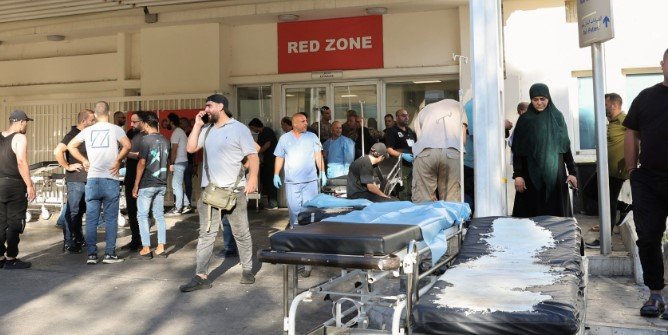Hezbollah accused Israel of carrying out recent page explosions in Lebanon, in what could be considered a dramatic escalation of tensions in the Middle East. The leading militant organization made this claim and it has sparked controversy and diplomatic tensions once again in the region. The unfolding situation carries significant implications for regional stability and international diplomacy. This article examines these allegations in detail, the wider geopolitical implications, and their potential consequences on world relations.
Background: The Lebanese-Israeli Tensions
The relationship between Lebanon and Israel has long been fraught with tension and conflict. Since the establishment of Israel in 1948, the two countries have been at odds over a range of issues, including territorial disputes, the status of Palestinian refugees, and the presence of armed groups like Hezbollah in Lebanon. The Lebanon-Israel border has seen multiple conflicts, including the Lebanese Civil War, the 2006 Lebanon War, and numerous skirmishes since.
Hezbollah, a Shiite militant group founded in the 1980s with support from Iran, has been a major player in Lebanese politics and a significant adversary of Israel. The group’s military activities and its role in the Lebanese political landscape have often brought it into direct conflict with Israeli forces. The recent accusation by Hezbollah adds a new layer to this complex and volatile relationship.
The Pager Explosions: What Happened?
In recent weeks, some pager explosions have been reported in Lebanon. These incidents have resulted in considerable destruction and increased anxiety among the people of Lebanon. It is very strange that pagers which are used for communications were not common targets of explosions making their occurrence very worrisome.
Hezbollah has publicly accused Israel of being behind these explosions. According to Hezbollah, the Israeli government orchestrated the attacks as part of a broader strategy to destabilize Lebanon and provoke unrest. The group claims that the explosions were intended to create fear and disrupt the daily lives of Lebanese citizens.
Israel, on the other hand, has denied any involvement in the explosions. Israeli officials have labeled the accusations as unfounded and part of Hezbollah’s ongoing campaign to blame Israel for various issues within Lebanon. The Israeli government has also expressed concerns about the potential for these accusations to escalate into a broader conflict.
Geopolitical Context: The Role of Regional Powers
To fully understand the significance of the Hezbollah accusations, it is essential to consider the broader geopolitical context of the Middle East. The region is marked by complex alliances, rivalries, and ongoing conflicts involving major international players.
Iran and Hezbollah
Iran is a major supporter of Hezbollah, offering the group financial, military, and logistical assistance. The relationship between Iran and Hezbollah is based on common ideological and strategic goals. In order to extend its authority in the Levant and oppose Israeli and Western interests in that area, Iran considers Hezbollah as an important partner.
The explosions in Lebanon could be seen as part of a broader struggle between Iran and Israel. The two countries have been engaged in a shadow war for years, with both sides employing various tactics to undermine each other. Hezbollah’s accusations against Israel could be interpreted as part of this ongoing confrontation.
The United States and Israel
The United States has been a longstanding ally of Israel, providing significant military and economic support. The U.S. has also been involved in diplomatic efforts to address regional conflicts and support Israel’s security. The accusations by Hezbollah could potentially complicate U.S. diplomatic efforts and influence American policy towards the region.
The Arab World
Given that you possess experience in area until October of two thousand and twenty-three, this is what you need to know about Lebanon’s key regional actors – especially Syria and Saudi Arabia. Specifically speaking, escalating tensions could have implications for Syria whose historical relationship with both Israel and Hezbollah is complicated at best. In addition, it might be important for considering changes in Lebanon from a Saudi Arabian perspective since the country has always remained an opponent of Iran.
The Potential Ramifications
The accusations by Hezbollah have several potential ramifications for the region and beyond. These include:
1. Escalation of Conflict
If the accusations lead to further violence or retaliation, the situation could escalate into a broader conflict. The potential for increased hostilities between Hezbollah and Israel could have significant consequences for regional stability and security.
2. Impact on Lebanese Politics
The explosions and the ensuing accusations could affect the internal dynamics of Lebanese politics. Hezbollah’s actions and the government’s response may influence the political landscape, potentially leading to shifts in alliances and power structures within Lebanon.
3. International Diplomatic Efforts
The situation could complicate international diplomatic efforts to address the broader Middle Eastern conflicts. The involvement of major international players, such as the United States and Iran, may influence diplomatic negotiations and strategies in the region.
4. Humanitarian Impact
The explosions and the potential for increased violence could have severe humanitarian consequences for the Lebanese population. The damage to infrastructure and the impact on daily life could exacerbate the already challenging conditions faced by many Lebanese citizens.
Historical Precedents: Similar Incidents in the Past
The importance of what we see today may seem clearer if we think back to earlier similar situations. There have been many instances in which Israel and its Neighbors have leveled allegations and there have been also fights between them. There are numerous examples from history that show us how these scenarios are likely to end up and what the worlds’ reaction might be like.
1. The 2006 Lebanon War
The 2006 Lebanon War, also known as the Second Lebanon War, was a conflict between Hezbollah and Israel. The war was triggered by Hezbollah’s kidnapping of Israeli soldiers and subsequent rocket attacks on northern Israel. The conflict resulted in significant casualties and damage, with both sides accusing each other of violations and aggression.
2. The Gaza Conflicts
The Israeli-Palestinian conflicts, particularly in Gaza, have seen numerous escalations and accusations between Israel and Palestinian militant groups. The cycles of violence and retaliation have often involved accusations of aggression and provocations, with significant impacts on civilian populations.
3. The Assassination of Rafik Hariri
In 2005, former Lebanese Prime Minister Rafik Hariri was assassinated in a car bomb attack. The assassination led to widespread speculation and accusations involving Syria and Hezbollah. The incident had far-reaching implications for Lebanese politics and regional relations.
The Role of Media and Public Perception
Media coverage and public perception play crucial roles in shaping the narrative surrounding such incidents. The portrayal of the pager explosions and the accusations against Israel will influence how the situation is understood by the international community and the general public.
1. Media Reporting
Different media outlets may present varying perspectives on the situation, influencing public opinion and diplomatic responses. The framing of the accusations and the portrayal of the parties involved can impact how the situation is perceived and addressed.
2. Public Reactions
Public reactions in Lebanon, Israel, and the broader international community will also play a role in shaping the response to the allegations. The level of public support or opposition can influence political decisions and diplomatic efforts.
Future Developments: What to Watch For
As the situation continues to unfold, several key factors will determine the trajectory of the conflict and its implications:
1. Investigations and Evidence
The investigation into the pager explosions and the evidence supporting or refuting the accusations will be critical. The findings of international and local investigations will impact the credibility of the allegations and the potential for diplomatic or military responses.
2. Diplomatic Efforts
The role of international actors, including the United Nations and major powers, will be crucial in managing the situation and preventing further escalation. Diplomatic efforts to address the root causes of the conflict and promote dialogue will be essential.
3. Regional Dynamics
The broader regional dynamics, including the actions and reactions of neighboring countries and international allies, will influence the outcome. The interplay between various regional and global interests will shape the response to the accusations and the overall stability of the region.
Conclusion
The accusations made by Hezbollah towards Israel concerning the pager explosions in Lebanon are a considerable advance in the ongoing tensions between the two sides. The implications for regional stability, international diplomacy, and the lives of those affected are far-reaching. In order to grasp the wider consequences of these allegations, it is important to keep track of developments as they unfold and responses from all parties involved.
The complexity of the Middle Eastern conflict and the involvement of various international actors add layers of depth to the current situation. The interplay of geopolitical interests, historical precedents, and media influence will shape the course of events and the international response.










